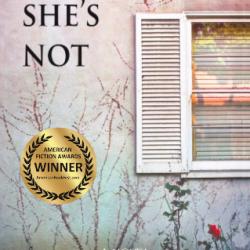 When I was four years old, I started writing and binding my own books. I’d write (and illustrate) them, and then, with a hole-punch, some string, and folding techniques worthy of an origami master with a traumatic brain injury, create my very own, DIY “book.”
When I was four years old, I started writing and binding my own books. I’d write (and illustrate) them, and then, with a hole-punch, some string, and folding techniques worthy of an origami master with a traumatic brain injury, create my very own, DIY “book.”
When I was eleven, I wrote my first novel. It was my third book. My first, a collection of humorous short stories, character sketches, and trenchant, thoughtful essays, was titled, Life as a Kid. It was quite enthusiastically reviewed by my father and an alcoholic friend of my mom’s. My second book, Getting in Touch with Your Feelings, was a runaway non-fiction bestseller amongst buyers who were my mom and me.
My debut novel, Travels with Snickles, related the spellbinding adventures of a brilliantly funny, preternaturally intelligent, and almost painfully sensitive young boy, John, who, by circumstances and temperament, is forced to run away from home. From the moment he strikes out on his own, John has by his side his beloved talking black cat, Snickles. Besides having quite the rapier wit, Snickles also excels at eating in restaurants. He sits in a kiddie chair (of course), and always uses a napkin, linen when available.
Here is an excerpt from the second chapter (“The Adventure Begins”) of Travels with Snickles, featuring our hero and his cat in a restaurant.
“You gonna eat those fries?” said Snickles.
“I certainly am,” said John.
“I want some. All I’ve got left on my plate is this pickle,” said Snickles.
“Sorry,” said John. “These fries are mine.” (John was terribly fond of french fries. He didn’t speak French, though.)
“But cats hate pickles.”
“Snickles hates pickles?”
“You know I also hate rhyming.”
“You’re some cat.”
“You’re some hog. Give me your fries.”
“All of them?”
“No. Half.”
“No way!”
“Oh, well. I guess I’ll order another tuna sandwich, then.”
“Snickles, we’re not made out of money, you know,” said John. “We have to be responsible.”
“How much money do we have?”
“Not nearly enough!”
Can you believe it was another thirty-five years before I got a literary agent? Me neither.
Anyway, I always knew I’d be a writer. (Which is vastly different than “I always wanted to be a writer,” which is a whole other, life-dominating saga.) To that end, then, in 1980, when I was twenty-two years old, I got a job working in a bookstore. I figured that if I was going to make my living writing books, I should know the book business from the ground up. So I got a job at the Stacey’s bookstore in downtown San Francisco. (In 2009, after eighty-five years in business, venerable Stacey’s closed. You can watch a YouTube video about that closing here.) I continued to work in bookstores, off and on, for many years afterward. (I used to be a major book freak/collector. I always worked in a bookstore’s shipping and receiving department, because that’s where you first see all the new titles. Pretty soon I’m collecting first editions. That’s how I caught bookcollectorfreakatitis, of which I’ve since been cured, sort of.)
At the time I started working in it, the book business was run by people who deeply cared about books: who knew authors; who knew literature; who understood and cherished what books have always meant to the history, evolution, and expression of ideas. It was a profound appreciation of the whole aesthetic of books—the aura of them, really—that brought people into that career, whether they worked as a clerk on the sales floor of a bookstore, a traveling publisher’s rep, a retail buyer, or in a publishing house. They were there because they loved books, period.
Today there are still lots and lots of people in the book business who passionately care about books, of course. But for so long now there have also been so many other people in the book business—people who wouldn’t know a decent book from a matchbook, and who wouldn’t care about the difference, either, as long as the matchbook had a really bitchin’ cover—that … well, that finally we have the abysmal state of the book business today.
Which, to be clear, is a state that I love. I am thrilled that the book business is finally choking to death on its own vomit. (Yow: sorry for that awful image. But … well, that is what’s happened. It all started, see, with the discount mega-bookstores, because then there was all that floorspace that needed filling, see, and … .) I mean, I loved the old way of publishing, too: agents, editors, publisher’s galleys, all that. I’m mad about that stuff. I’ve spent my whole life wanting to be part of that model.
But that model has tripped and fallen off the runway. She’s gone.
And with the new way—with the new model—I get to bring my work directly to my audience. (Um … and in my new book I swear I’ll use better metaphors.)
And oh, but yayeth for that freedom.
No mid-level advertising doink deciding how to “package” my “message.” No marketing flack asking me to identify the “take away” of my book. No more infernal talk about the “felt need” of a book. (“I guess there was just no felt need for it,” is how people in Christian book publishing explain yet another of their excruciatingly boring books that failed to sell.)
Do you know that for years now, the people in a publishing house who decide what books will or won’t get published are not the editorial people? It’s the marketing and sales people. A big editor in a big house can suggest a book—but if the heads of both advertising and marketing don’t also give it the thumbs-up, that book dies a swift death. The editor who used to discover, champion, and publish books based of their literary merit is now a project manager overseeing the production of books that his counterpart of twenty years ago wouldn’t have touched with a twenty-foot pencil.
It’s a new world now, baby!
For me, if feels full circle. I’m happily back to where I was when I was a kid, creating my own DIY books.
I’ve got one more book to ghostwrite, for one more big book publisher, and then I’m as free as I wanna be.
And, oh, God, do I wanna be. I can’t even begin to tell you how much. (Though, all that said: my two books, Penguins, and I’m OK—You’re Not were published exactly how I wanted them to be. It was awesome.)
Speaking of the bygone era of the book business, check out this video. This is definitely when the “E” in “Ebook” stood for Excruciating Amount of Work.












